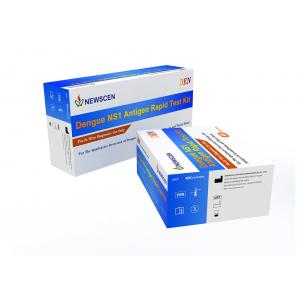

Add to Cart
Dengue NS1 Antigen Rapid Test
For the qualitative detection of Dengue NS1 Antigen in serum/plasma and whole blood
Dengue NS1 Ag Rapid Test Kit Dengue Fever Antigen Fast Test Home Use Mosquito-Borne Infectious Disease Diagnostic Kit
Intended Use
The Dengue NS1 Antigen Rapid Test is a qualitative test for the
detection of NS1 antigen of dengue virus in human serum or plasma..
Dengue fever is a worldwide health problem, and in epidemic
proportions in some countries. The World Health Organization
estimates that annually, 50-100 million people are infected
worldwide with the dengue virus.
Studies have shown that early detection of Dengue NS1 virus using tests like the Dengue NS1 Rapid test can help in early confirmation, clinical treatment, and control of dengue viral infections. This test is effective new diagnostic tools for early diagnosis of dengue virus infection. The test is for In-Vitro Diagnostic use only.
Principle
Serum, or plasma, samples may be used with this test. A sample is
dispensed on to the membrane The sample then migrates by capillary
action towards the test site where anti-Dengue antibodies are
immobilized.. The NS1 antigen present in the sample will bind to
the immobilized Mab-anti-Dengue Antibodies immobilized in the test
zone. on the membrane. Next the sample buffer is applied which in
turn reconstitutes the dried Dengue gold anti-NS1 mouse antibody
conjugate.
The Dengue conjugate then migrates towards the test zone and binds to Dengue NS1 antigen-Dengue Anti-NS1 antibodiy to form a complex on the membrane as a separate red to blue lines if Dengue NS1 Antigens are present in the sample. The intensity of the test lines will vary depending upon the amount of antigen present in the sample. The appearance of pink to dark blue line in the test region should be considered as positive for NS1 antigen in the sample. There will be a second control line on the membrane which will be invisible until the test is run. It will show up as a red to blue control line to indicate that the test is functioning properly.
Storage
Store the kit between 4°C and 30°C. Do not store the kit in direct
sunlight. Only remove and open the number of cassettes to be
immediately used. The test kit should be used until the expiration
date of the kit. Please refer to the package label for the
expiration date.
Assay Procedure
All test cassettes, and specimens must be at room temperature (4-
300C) before running the assay procedure. Serum or plasma samples
should be used immediately after collection. The use of Icteric or
Lipemic samples should be avoided.
1. Pipette 30 μl of serum or plasma,or 50 μl of whole blood into
the “S” well.
2. Next dispense 2 drops of sample diluent buffer into the “S”
well.
3. Read the results between 15-20 minutes. Discard the test
cassette after 20 minutes. Do not read after 20 min.
Interpretation of Results
Negative: The control line is the only line visible in the test zone. No NS1 antigens were detected. The result does not exclude dengue infection.
Positive: The control line and the test line line is visible in the test
zone. The test is positive for NS1 antigens. This is indicative of
dengue infection.
Invalid: The test results are INVALID, if no control line is visible,
regardless of the presence or absence of line in the test zone of
the cassette.. Repeat the test using a new cassette.
Expected Value
Recent studies have shown that DENV nonstructural protein 1 (NS1) is detectable in the blood as early as the onset of symptoms and persists well into the convalescent phase of the infection. Primary NS1 kit for (i) early-convalescent-phase samples, (ii) acute-phase samples with false-negative PCR results, and (iii) IgM-negative convalescent-phase samples from patients with confirmed secondary DENV infections.
Results show that NS1 can be detected in 22% of serum samples collected more than 10 days after the onset of illness and in 22% of samples that did not elicit an IgM response. Additionally, NS1 was detected in 37% of the tested acute-phase samples with false-negative PCR results, suggesting that NS1 detection may be valuable in increasing the sensitivity of current acute-phase diagnostics.
